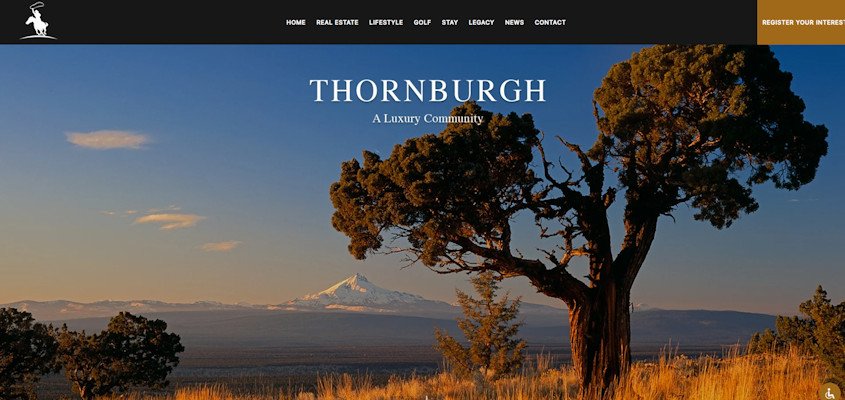Appeals court sends Thornburgh Resort approval back to state land-use board to reconsider Warm Springs Tribes’ issue

(Update: Statement from Thornburgh Resort)
Says LUBA needs to consider Tribes' argument on 'no net loss' of fishery resource
SALEM, Ore. (KTVZ) -- The Oregon Court of Appeals on Wednesday sent Deschutes County's approval of a revised master plan for the long-debated Thornburgh Resort west of Redmond back to the state Land Use Board of Appeals, finding it was wrong to dismiss the Warm Springs Tribes' issues regarding a requirement for no net loss of fish habitat.
In February, the Confederated Tribes of the Warm Springs Reservation of Oregon filed a brief with the court, asking the court to send back the Jan. 12 decision of the land-use appeals board (LUBA) to address issues that the Tribes raised in connection with Deschutes County's approval of a proposed modification of Thornburgh Resort’s Fish and Wildlife Mitigation Plan.
The court Wednesday issued a 28-page ruling that returned the case to LUBA for reconsideration of the Tribe's challenge. The initial LUBA decision in January already sent some other aspects of the revised resort plan's approval back to the county for further review.
The appeals court ruled Wednesday, "We conclude that the Tribe adequately articulated in its opening brief before LUBA that the treaty-protected fishery resource is a resource to which there can be 'no net loss' or degradation," under Deschutes County code.
The court added, "We conclude that the Tribe adequately preserved before the board (of county commissioners) and presented to LUBA its arguments concerning the relationship between the Tribe’s treaty rights and the 'no net loss' standard. LUBA erred in concluding otherwise."
The nearly 2,000-acre resort at Cline Buttes has been in the works, and tied up in challenges and appeals for nearly 20 years.
If LUBA's review finds credence in the Tribes' challenge, it would send that matter back to the county to reconsider, along with the other issues already on remand.
Robert A. Brunoe, secretary treasurer/CEO of the Confederated Tribes of Warm Springs, issued this statement reacting to the appeals court ruling:
“We are pleased that the Court of Appeals understands the importance of ensuring that land use decision makers respect our treaty rights, co-management responsibilities, and sovereign interests when it comes to the fish resources of the Deschutes Basin.
"The Deschutes River and its tributaries are in our homelands, and we have lived and fished on these waters since time immemorial. The land and water impacted by the 2022 Fish and Wildlife Mitigation Plan lies within our ceded territory where we retain treaty-protected rights to take fish and to have fish to take. Our Tribal knowledge – both scientific and cultural – is essential to deliver a healthy fishery for our people."
The ruling is part of a greater voice in Central Oregon issues sought recently by the Confederated Tribes of the Warm Springs Reservation of Oregon, which says it's "a federally-recognized, sovereign Indian tribe occupying the Warm Springs Reservation, which was reserved for its exclusive benefit by an 1855 Treaty with the United States. The Reservation stretches from the summit of the Cascade Mountains to the cliffs of the Deschutes River in Central Oregon."
The appeals court rejected other issues raised ("assignments of error") in this set of appeals filed by Central Oregon LandWatch, long-time foe Nunzie Gould and, but they were pleased to see the Tribal matter returned for another round of discussion.
LandWatch Staff Attorney Carol Macbeth had the following statement to share:
“LandWatch is gratified by the Court of Appeals’ decision, which reversed and remanded the case back to the Land Use Board of Appeals to take into account the ancient fishing rights of the Confederated Tribes of the Warm Springs in considering Thornburgh Resort's plans to mitigate for effects of the resort on fish and wildlife habitat."
"We appreciate that the Court recognized and upheld the Tribes' rights as reserved in their 1855 Treaty to take fish throughout the Deschutes Basin. Recognition of the Tribes' rights benefits not only the Tribes, but all Central Oregonians.”
Thornburgh Resort provided this release Thursday morning, focused on the challenges that the appeals court rejected:
OREGON COURT OF APPEALS REJECTS NINE OUT OF TEN CHALLENGES TO THORNBURGH’S REQUEST TO REDUCE WATER CONSUMPTION BY ONE-THIRD.
Salem, Oregon, (May 2, 2024) Yesterday, the Oregon Court of Appeals denied nine out of 10 challenges that were raised in Thornburgh Resort’s petition to build less golf and use less water. A single issue was remanded back to the Land Use Board of Appeals (LUBA). Previously, LUBA found the Tribes had not adequately raised arguments that the county needed to consider its 1855 treaty rights when determining Thornburgh met the no net loss standard. Thornburgh had shown its plans will provide net benefits to the fisheries resource in all stream reaches affected by the resort.
“We are grateful that the court, in rejecting nine of the ten challenges, is paving the way for Thornburgh to follow through on our desire to reduce our water consumption by 1/3”, said Kameron DeLashmutt. “As a community, Thornburgh is committed to preserving the health of the natural landscape, as well as the rivers and aquifers that maintain life in the region, by scaling back several previously approved aspects of the development.”
“One of the things we can all agree on is that water is a crucial resource,” said DeLashmutt. “In reviewing the FWMP, the Land Use Board of Appeals cited fisheries scientist Dr. Lucius Caldwell, who said the following about the FWMP, “In conclusion, the findings indicate that the combination of planned groundwater pumping at Thornburgh Resort and the associated mitigation planned to offset this pumping as described in the 2022 Fish and Wildlife Mitigation Plan (NCI 2008; Newton 2022), appear to be a net benefit for both fish habitat quantity and quality at all sites evaluated and would result in no net loss of fish habitat quantity or quality.”
In addition to having an already environmentally positive plan set in place, Thornburgh is committed to taking additional steps to ensure the long-term sustainability of both the resort and the Deschutes Basin. Beyond the net benefit delivered by our FWMP, Thornburgh, at the suggestion of the Tribes, has partnered with the Crooked River Watershed Council via a $400,000 donation to address the needs of the Crooked River for long-term sustainability:
- In 2023, CRWC conducted a water sampling and analysis project to determine the source of nitrogen in the river to determine remediation efforts.
- From 2024-2028, CRWC has planned fishery-focused improvements along six miles of the Crooked River. These improvements include elements designed to improve fish habitat, the diversification of vegetation and the health of side-channel habitats.
- From 2029-2033, CRWC has planned additional fishery-focused improvements along another five mile stretch of river. These improvements will focus on riparian fencing for livestock, off-channel livestock watering, riparian habitat improvements, along with adding fish habitat structures and native trees in the floodplain.
Thornburgh will continue this commitment by providing funding throughout the plan’s lifetime. “We are committed to maintaining and improving the wellbeing of our natural resources, and through this plan with the CRWC, we hope to maintain this wellbeing so that future generations of Oregonians and visitors alike can come and enjoy the natural beauty of Central Oregon,” said DeLashmutt.
In total, Thornburgh, in planning the community, has taken further steps than required, going beyond the minimum requirements and pursuing a higher goal of environmental consciousness. Thornburgh has foregone the construction of previously approved amenities like a golf course, multiple lakes, irrigated parks, and green space, along with a 20% reduction in overnight lodging. In their place, the resort will focus on native landscaping, utilizing local flora to create a healthy, water-sensitive ecosystem. This is in addition to the original development plans, which proposed a development density of only 1/3rd what the county code allowed, with 65% open space, or 30% more than the minimum required.
Furthermore, as required under Oregon law, Thornburgh is required to offset every single gallon of water it uses. As such, Thornburgh has purchased and ceased pumping from existing water rights throughout the Deschutes Water Basin in a one-for-one offset of its forecast water use once the resort has been fully built out in 20 years’ time. Currently, Thornburgh’s water use is a tiny fraction of the amount of water that it has returned to the aquifer and rivers, resulting in a net positive impact on the Deschutes Water Basin.
Thornburgh reports its annual water use and mitigation under its approved Fish and Wildlife Mitigation Plan. The 2023 report shows that the development only pumped 0.4 acre-feet of water while leaving 200 acre-feet instream and an additional 1,010.3 acre-feet in the aquifer. In total, for 2023, Thornburgh provided 1,210.3 acre-feet of water that would have otherwise been pumped, equating to a net benefit of over 394,375,189 gallons of water last year alone. Even at full capacity, Thornburgh’s water use is less than 5/100ths of 1% of the 3,500,0000 acre-feet of annual recharge in the Deschutes Basin and only 2/10ths of 1% of the Basin's total water use of 775,000 acre-feet.
About Thornburgh Resort:
Thornburgh is a residential community nestled in the foothills of the Cline Buttes outside Redmond, Oregon. Set within a 40,000-acre juniper forest, Thornburgh offers the finest golf and club facilities, stunning mountain vistas, miles of private hiking and bike trails, lake and beach club, swimming pool, state-of-the-art fitness and spa facilities, the pickleball and tennis complex, parks, kids camp, and superlative dining. In every decision we make, our guiding principle is to combine native beauty and thoughtful design to create a naturally elegant lifestyle.
--
We have also reached out to Deschutes County for reaction to the latest ruling and where things stand.




